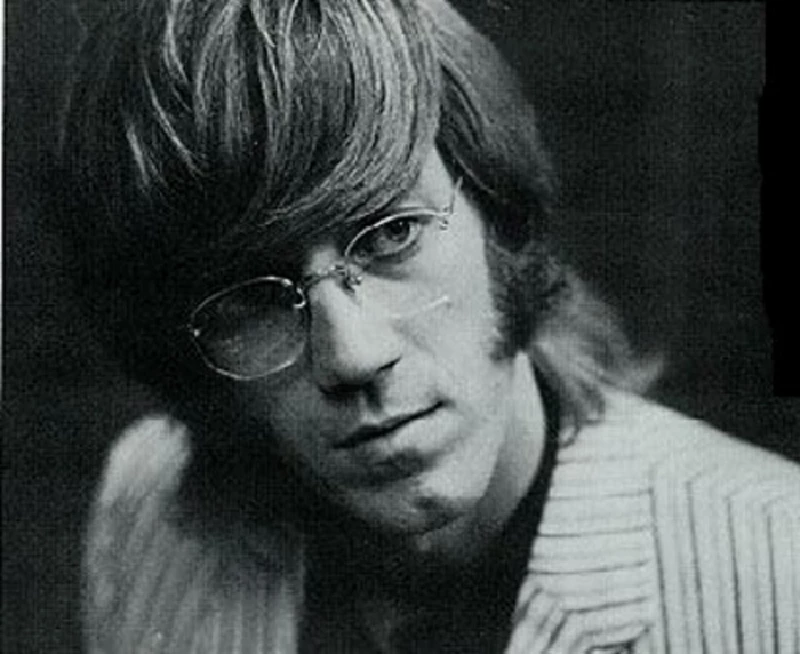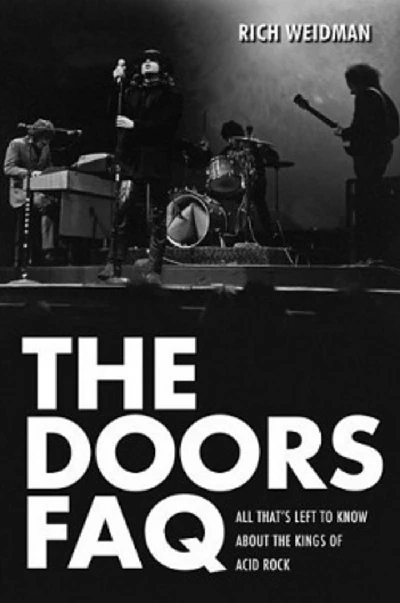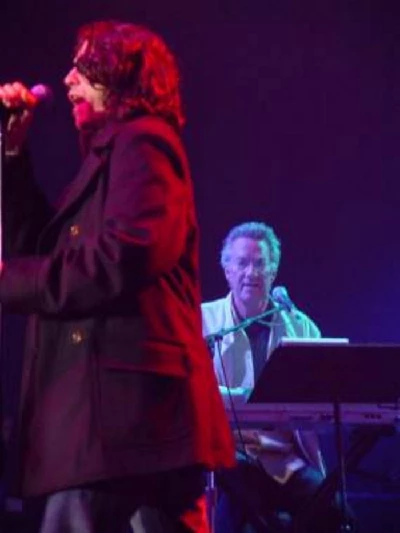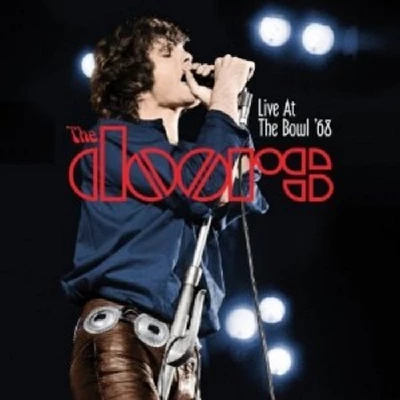Doors - 1939-2013
by Anthony Strutt
published: 25 / 5 / 2013

intro
Anthony Strutt reflects upon the career of Doors' keyboardist Ray Manzarek, who died in May from cancer
Raymond Daniel Manzarek, to give him his full name, was a founder member of the L.A. band, the Doors, alongside James Douglas Morrison, Robby Kreiger and John Densmore. The band in their six year career with Morrison left behind a body of work that still goes way beyond legendary status. They broke on through, they kicked down walls and they did a lot of drugs, but they also told us to free our minds and stand up for your rights. Born in Chicago at 3.30 a.m. on February 12th 1939, Ray had two brothers, and in his youth was an excellent baseball player. He was introduced to the piano at the age of seven or eight, while his father played guitar. At an early age, he discovered records, and developed a love of the blues and especially of jazz, which was a prime element of the Doors' backing music. Between 1962 and 1965, he studied Cinematography at the University of California, Los Angeles alongside an unknown Jim Morrison, whom he befriended. Together they studied the work of filmmakers such as Godard, Truffaut, Bergman and Josef Von Sternberg, as well as both read Jack Kerouac's 'On the Road', which was to prove an ever bigger influence. To support himself through college, Ray joined his brother's surf band Rick and the Ravens in which he sang and played piano. No official recordings were released but bootlegs are out there, and it was during one show that Morrison joined the band on stage for what was his debut performance. While at UCLA, Ray made the student film 'Evergreen', but Jim's efforts into film were laughed at. Jim thus became steadily more beatnik and began to lose himself in the art of the written word. Both Jim and Ray said their goodbyes. Jim was planning to go to New York while Ray intended to stay in L.A. when one day, after Manzarek thought that he had left, he bumped into a sun-tanned Jim on Venice Beach. Jim spoke to him the introduction to 'Moonlight Drive', and from that moment a song partnership was born. Between 1965 and 1967, the Doors, as they became, grew in style, homed in their craft, and in 1967, the summer of love, they had a huge hit with 'Light My Fire', which, originally over seven minutes in length but edited down to three for its single release, sold over a million copies. 'The Doors', their 1967 debut album, finished with 'The End', a song in which Morrison sung about killing his father and having sex with his mother, lead to the whole record being heavily censored. The Doors took a while to build a following, and originally did a lot of dates in support to other Los Angeles bands, including a residency with Love whose singer Arthur Lee told his label boss at Elektra Records, Jac Holzman, to turn up early for the support. Holzman didn't get them, but on the returning nights it clicked and they were then signed to Elektra after being dropped by Columbia. The band had a famous career, played huge stadiums, made some beautiful and hypnotic music and recorded six albums of music between 1967 and 1971. As well as 'The Doors', these included 'Strange Days' (1967),'Waiting for the Sun' (1968), 'The Soft Parade' (1969), 'Morrison Hotel' (1970) and'L.A. Woman' (1971). Upon the completion of 'L.A .Woman', Jim took a leave of absence with his girlfriend Pamela Courson and left for Paris never to return, dying at the age of twenty-seven on July 3rd 1971. Post Morrison, the surviving Doors produced two final albums, 'Other Voices' (1971) and 'Full Circle' (1972), the better of the two before going their different ways. In the early 1980s, several bands such as Echo and The Bunnymen and the Icicle Works came along who mixed their post-punk rhythms with the majestic lyricism and romantic, mystical style of the Doors. This and the arrival of video introduced the band to a new generation. Ray meanwhile never stood still. After the Doors ended, he made three solo albums, 'The Golden Scarab' (1973), 'The Whole Thing Started with Rock and Roll Now It's Out of Control' (1974) and 'Carmina Burana' (1983). The first of these included the first piece of recorded work by Patti Smith. He also released two albums with his next band Nite City. These were the self-titled 'Nite City' (1977) and 'Golden Days Diamond Night' (1978). He also produced the Los Angeles punk band X, and was responsible for recording more albums than is credited on the internet, including a number with both Michael McClure and Darryl Read. In 1998, he published his autobiography, 'Light My Fire: My Life with the Doors'. He also shortly after bought the rights to the Doors name, making an enemy out of John Densmore, who choose not to regroup with Ray and Robbie, when they ressurected the band for the new century. They went through various line-up changes, with several people standing in for Jim including the Cult's Ian Astbury, and several changes of name. They started out as the Doors of the 21st Century, but when Densmore sued became D21C, then Riders on the Storm and more recently Manzarek-Kreiger. In addition to this Ray published two novels, 'A Poet in Exile' in 2001, in which he imagined Jim as a happily married man living on a desert island, and 'Smoke Moon', a ghost story set in the American Civil War, in 2006. He also directed his debut proper feature film, 'L.A. Woman'. Ray was a softly spoken guy with a voice like a kind uncle that calmed you down and rocked you to sleep, I, for one, already miss him. Rest in peace, brother. God bless you, Raymond Daniel Manzarek.
profiles |
|
The Doors FAQ: All That's Left To Know about the Kings of Acid Rock (2012) |

|
| Anthony Strutt finds Rich Weidman's new book on the Doors to be impressively up-to-date and one of the best books on the subject yet |
live reviews |
|
Wembley Arena, London, 11/12/2003 |

|
| The Doors recently controversially reformed with former Cult frontman Ian Astbury taking the place of Jim Morrison. In wet conditions, and at his least favourite UK venue, Anthony Strutt has "the best night" of his life |
favourite album |
|
Live at the Bowl '68 (2012) |

|
| Anthony Strutt reflects on the Doors' live album, 'Live at the Hollywood Bowl', which originally issued in 1987, has just been re-released in an expanded edition |
| L.A. Woman (2012) |
most viewed articles
current edition
Carl Ewens - David Bowie 1964 to 1982 On Track: Every Album, Every SongArmory Show - Interview with Richard Jobson
Colin Blunstone - Thalia Hall, Chicago, 16/7/2025
John McKay - Interview
Visor Fest - Valencia, Spain, 26/9/2025...27/9/2025
Bathers - Photoscapes 1
Billie Eilish - O2 Arena, London, 10/7/2025
Loft - Interview
Robert Forster - Interview
Sir Tim Rice - Interview
previous editions
Manic Street Preachers - (Gig of a Lifetime) Millennium Stadium, Cardiff, December 1999Heavenly - P.U.N.K. Girl EP
Beautiful South - Ten Songs That Made Me Love...
Oasis - Oasis, Earl's Court, London, 1995
Prolapse - Interview
Boomtown Rats - Ten Songs That Made Me Love....
Peter Perrett - In Dreams Begin Responsibilities Interview Part One
Coldplay - Wembley Arena. London, 16/8/2022
Trudie Myerscough-Harris - Interview
Pixies - Ten Songs That Made Me Love...
most viewed reviews
current edition
Davey Woodward - Mumbo in the JumboAmy Macdonald - Is This What You've Been Waiting For?
Sick Man of Europe - The Sick Man of Europe
Phew, Erika Kobayashi,, Dieter Moebius - Radium Girls
Lucy Spraggan - Other Sides of the Moon
Bush - I Beat Loneliness
Suzanne Vega - Flying With Angels
Alice Cooper - The Revenge of Alice Cooper
Blueboy - 2
Cynthia Erivo - I Forgive You
Pennyblackmusic Regular Contributors
Adrian Janes
Amanda J. Window
Andrew Twambley
Anthony Dhanendran
Benjamin Howarth
Cila Warncke
Daniel Cressey
Darren Aston
Dastardly
Dave Goodwin
Denzil Watson
Dominic B. Simpson
Eoghan Lyng
Fiona Hutchings
Harry Sherriff
Helen Tipping
Jamie Rowland
John Clarkson
Julie Cruickshank
Kimberly Bright
Lisa Torem
Maarten Schiethart